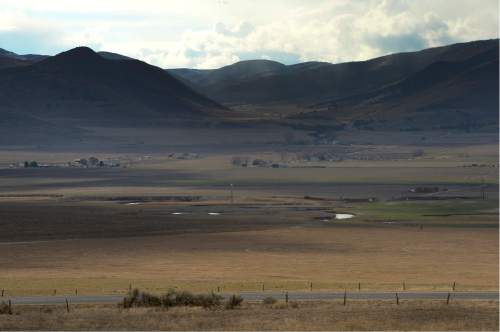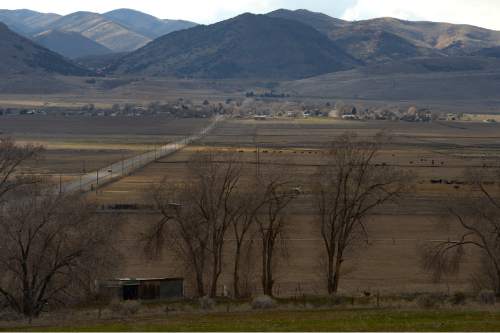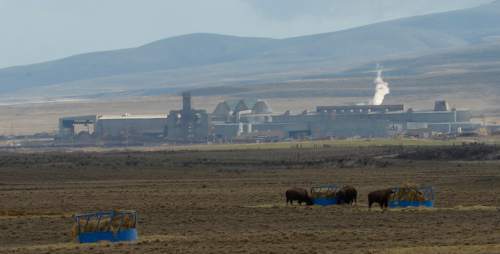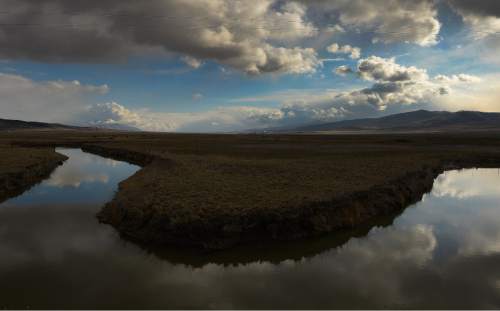This is an archived article that was published on sltrib.com in 2015, and information in the article may be outdated. It is provided only for personal research purposes and may not be reprinted.
Former U.S. Bureau of Reclamation commissioner Daniel Beard says Congress has a soft spot for water projects.
For proof, the author looks no farther than Eagle Lanes in Duchesne, Utah, population 1,799.
Back in the 1980s, the town was surging during construction of water projects in the remote northeastern corner of the state. But Duchesne leaders complained all the extra people were increasing town expenses and asked for cash assistance.
They got a $450,000, six-lane bowling alley instead. Former U.S. Rep. Howard Nielsen of Utah requested — and got — the money from the Bureau of Reclamation.
"Congress is willing to spend taxpayers' money on almost anything related to a water project," Beard writes in his book, "Deadbeat Dams: Why We Should Abolish the U.S. Bureau of Reclamation and Tear Down Glen Canyon Dam."
More importantly, he says, the bowling alley "demonstrates an appalling lack of judgment and proper decision making by federal officials.
"No business plan. No economic analysis or cost-benefit analysis," he writes. "Just a wink and a nod, and off they went."
To Beard, Utah's proposed Bear River Project and the Lake Powell Pipeline aren't too far off from that federally-financed bowling alley in the middle of God's Country, Utah.
Beard is currently on a national tour promoting his book with an emphasis on informing the public of the complicated, expensive and controversial world of water.
Utah is mentioned often in the book. The Deadbeat Dam book tour makes its first stop in the state on the eve of Utah State University's Spring Runoff Conference, which starts Tuesday.
"We face challenging times — with an extended drought of more than a decade, increasing water demands, and focused efforts to restore rivers in national parks and to recover the populations of endangered fish," said Jack Schmidt, a professor at Utah State University's Department of Watershed Sciences. "In these challenging times, out-of-the-box thinking is needed if we are to find true innovative solutions."
After Beard's career of in-the-box thinking — as a commissioner of the U.S. Bureau of Reclamation from 1993 to 1995 and in various positions in public and private water-related agencies in Washington, D.C., for the past four decades — he now is decidedly out-of-the-box.
Despite, or perhaps because of, years working in water development, Beard has become a skeptic of the business of water. Like many conservationists, he supports deconstructing much of his legacy.
At a time of extended drought and Western states already practicing or expected to announce water rationing, the idea of tearing down dams, draining reservoirs and dissolving the Bureau of Reclamation is shocking to many and downright silly to others.
But not all.
Beard found motivation for writing his book a year ago while in Salt Lake City for a showing of "DamNation," a film sponsored by Patagonia.
"I expected 10 or 15 people — old folks with Birkenstocks," Beard told the Tribune. "I was shocked to see it was standing room-only and everybody was under 35 [years old]. They were excited, engaged and hungry for information about bringing down dams. This shift has been coming for awhile."
In the book, Beard credits former U.S, Rep. Jim Hansen of Utah with boosting, perhaps inadvertently, the idea of tearing down dams. During a House Resources Committee hearing in 1997, Hansen invited environmentalists to talk about their idea to drain Lake Powell behind Glen Canyon Dam.
"From the opening gavel, there was no mistaking the intent of the hearing," Beard writes. "The first few panels of witnesses firmly opposed draining the reservoir and they portrayed it as a ludicrous idea. The few witnesses who were allowed to testify in support of the proposal to drain the reservoir were then brought before the committee.
"They were ridiculed by most of the Western legislators as naive, misguided, or worse."
But the environmentalists were not embarrassed during the hearings. They were thrilled the idea was drawing national attention and spreading the concept that dams were not the permanent structures so many believed them to be.
"Congressman Hansen did everyone a favor by holding these hearings. Even though he didn't mean to, the hearings proved that all it takes to remove dams and give us back our free-flowing rivers is political will," Beard writes. "This hearing gave the issue of dam removal legitimacy, and it energized efforts to work for removing structures rather than building more of them."
There are, of course, those who still consider the idea of tearing down dams during an extended drought mind-boggling.
"How are we going to survive this year with the warmest, driest winter ever and a population we have never had before?" asked Richard Bay, CEO of the Jordan Valley Water Conservation District. "The answer is that we need to focus on conservation and being more efficient.
"But we will make it because of dams and reservoirs that have been built," Bay added. "The storage from those dams is critical to support our lifestyle and the economy we have built. Any responsible person would say it is not reasonable in any stretch of the imagination [to dismantle dams]."
Bay is a supporter of the Bear River Project, a $1.5 billion series of reservoirs and pipelines to provide water to the Wasatch Front.
Farther south, the water politics are more clear for Beard. He believes Glen Canyon Dam should be taken down, allowing the Colorado River corridor to be restored to its natural environment. The water, he says, should be used to help fill Lake Mead in Nevada.
While Salt Lake residents at the documentary showing last year encouraged Beard to share his intimate knowledge of the wacky water world, his daughter also gets some of the credit.
The two had been on a long day of touring water projects in Nevada and he turned to ask the then-teenager what she thought of his job. "Dad," she said, "this has been the most boring day of my life."
Once his pride recovered, Beard thought about her comment.
"It was a wake-up call for me," he writes. "The general public is not interested in the details of water project fights or the nuances of water legislation. It's just too abstract or esoteric or dull.
"I knew there had to be a good reason why no one else had spoken out on these issues," he adds. "There was a need to trudge ahead. There should be a national outrage over the billions of dollars being spent to finance the lifestyle of an elite group of individuals, and that group wants even more handouts."
Twitter: @BrettPrettyman —
Deadbeat Dams: Why We Should Abolish the U.S. Bureau of Reclamation and Tear Down Glen Canyon Dam tour
Daniel Beard, former Commissioner of the U.S. Bureau of Reclamation and author of the book "Deadbeat Dams: Why We Should Abolish the U.S. Bureau of Reclamation and Tear Down Glen Canyon Dam" is visiting Utah for a series of events in the coming weeks.
Here's where to see him:
March 30 — "New Perspectives on Western Water," Hosted by College of Natural Resources, Utah State University, Logan, 4 p.m.
March 31 — Reading at Ken Sanders Rare Books, 268 S. 200 East, Salt Lake City, 7 p.m.
April 1 — "Saving the Colorado River: A New Perspective," hosted by Glen Canyon Institute at the Dumke Auditorium, Museum of Fine Arts, University of Utah, Salt Lake City, 7:30 p.m.
April 2 — Book reading and discussion at Back of Beyond Books, 83 North Main St., Moab, 6:30 p.m.
April 3 — Presentation at the Charles Redd Center for Western Studies, Education in Zion Auditorium, Brigham Young University, Provo, 9 a.m.











